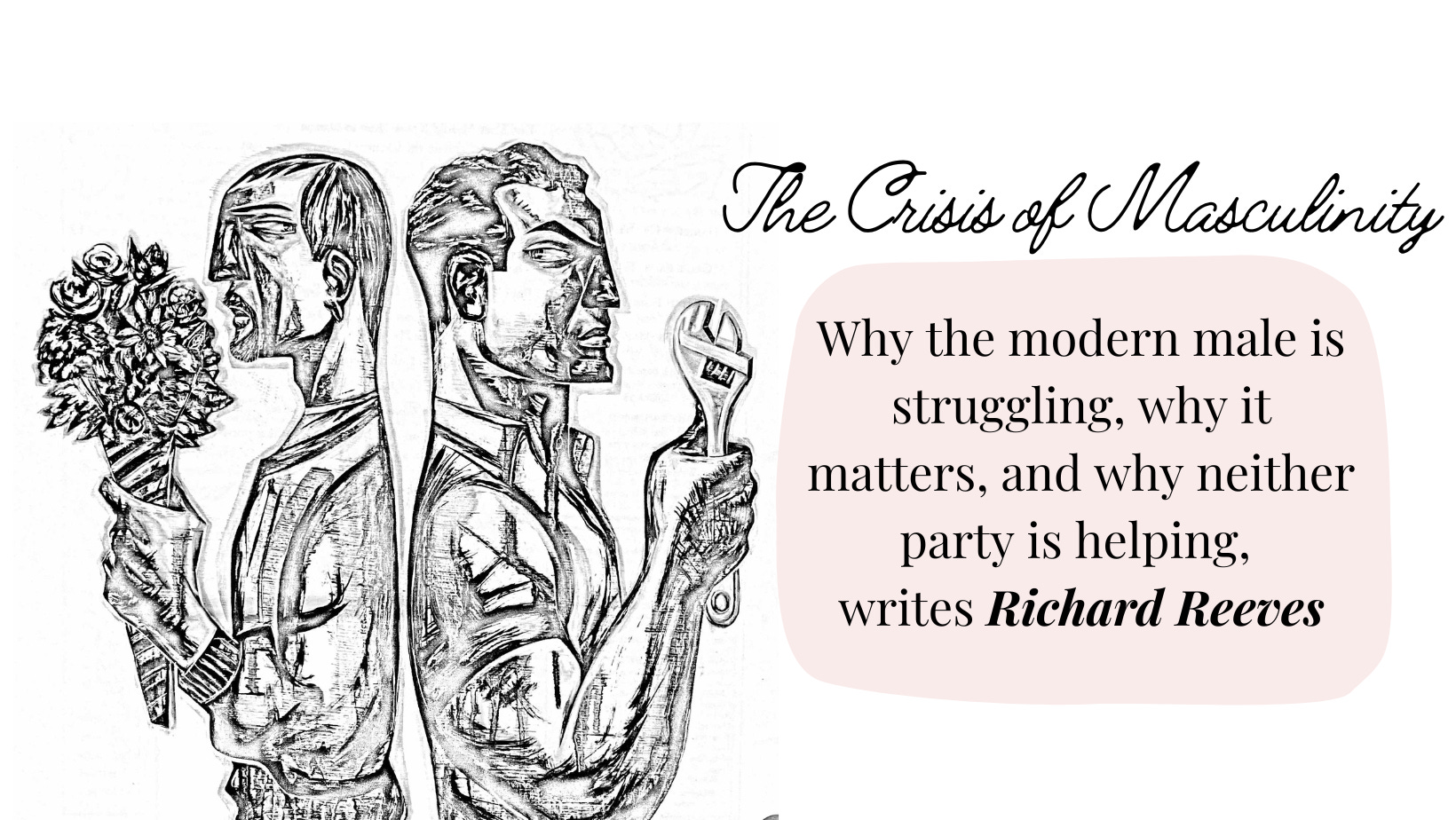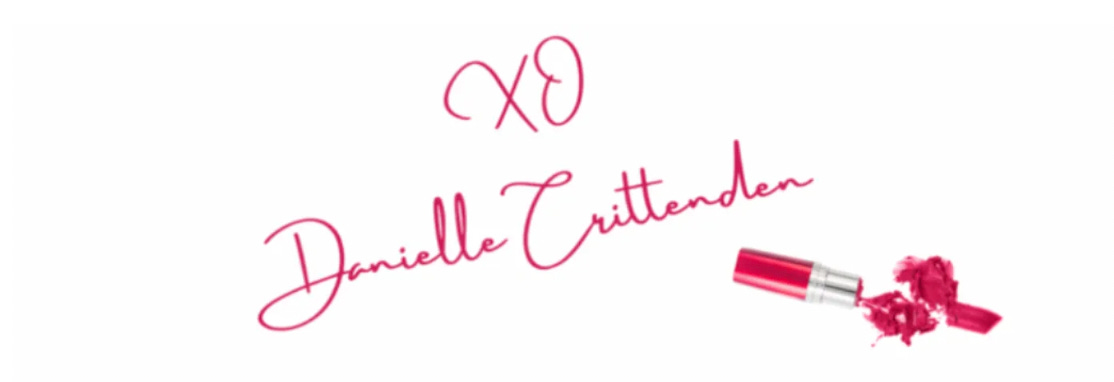The Crisis of Masculinity
Richard V. Reeves on why the modern male is struggling, why It matters, and why neither party is helping.
October 2022
THIS MONTH WE are thrilled to publish an exclusive excerpt from Richard V. Reeves important new book on the crisis facing men and boys across the developed world. Male decline on every level — economically, emotionally, and educationally — in stark contrast to their female peers, has become a Problem No One Wants to Name.
First, it raises very stark and specific biological sex issues in an era when gender is increasingly viewed as a “choice” and societal construct. Second, it challenges the longstanding feminist narrative that patriarchy is the problem, and women’s rights should remain the focus of any discussion about sex discrimination. Third, to even raise this topic throws you into a partisan trench on one side or the other. As Reeves notes, “Politicians on both left and right have failed to engage constructively with the problems of boys and men. Views on what it means to be a man in the twenty-first century have hardened along partisan lines.” But, Reeves insists, “We can hold two thoughts in our head at once. We can be passionate about women’s rights and compassionate toward vulnerable men and boys.”
This excerpt deals with the third issue of politics. But I urge our subscribers to read the whole book, as Reeves offers many creative solutions in addition to simply raising the problems. That’s rare in such a book — as is his forceful, and very readable, writing, which is infused with his native British charm and humor.
ALSO! We are planning on launching a bi-monthly PREMIUM edition of the newsletter, with exclusive content available only to paying subscribers. Content will include short podcast conversations between me and interesting femsplainers (and the occasional mansplainer, such as — this month! — Richard Reeves) as well as never-before-published online and original essays by myself and others. We have set the monthly subscription as low as Substack will allow: $7 per month, or $30 annually. All existing subscribers will receive this month’s Premium edition for free (starting October 15) and if you like it, you will be able to sign up for the paywalled content. Scroll down to the box with more information. ~ Danielle Crittenden.
MY SONS ATTENDED a school with a “culture of toxic masculinity.” It was perhaps not the first place you would look for it. Bethesda-Chevy Chase High School serves an affluent, liberal, highly educated suburban community just outside Washington, D.C. A third of the adults in the county have a graduate degree. Four out of five voted for Joe Biden. In 2019, the school district added a third option for student gender. If there is a liberal bubble, this is the bubble inside that bubble.
But in 2018 an incident occurred at the school that generated widespread media coverage. Here’s what happened. A boy at the school created a list of his female classmates, ranked in terms of their attractiveness, and shared it with a number of his friends, some of whom added their own opinion. Months later, one of the girls saw the list on another boy’s laptop. A number of girls complained to the school administration. The boy who created the list was reprimanded and given detention. A protest ensued. “It was the last straw, for us girls, of this ‘boys will be boys’ culture,” one of the young women involved to the Washington Post.
Part of a statement read out at a protest outside the principal’s office was the following demand: “We should be able to learn in an environment without the constant presence of objectification and misogyny.” Large meetings were held in the school to discuss culture. The boy who created the list apologized personally to the girls in question, and to the Washington Post.
What was instructive about the incident was the way it was immediately framed, especially in media coverage, as an example of “toxic masculinity.” If that is really the case, the term has acquired such a broad definition that it can be applied to almost any anti-social behavior on the part of boys or men.
It is one thing to point out that there are aspects of masculinity that in an immature or extreme expression can be deeply harmful, quite another to suggest that a naturally occurring trait in boys and men is intrinsically bad. Indiscriminately slapping the label of “toxic masculinity” onto this kind of behavior is a mistake. Rather than drawing boys into a dialogue about what lessons can be learned, it is much more likely to send them to the online manosphere where they will be reassured that they did nothing wrong, and the liberals are out to get them. Adolescent girls are after all capable of similar kinds of bullying and disrespect, often towards other girls, but it is not instantly cast as “toxic femininity.”
This incident at our high school highlights the first of four major failings of the political Left on issues related to boys and men, which is a tendency to pathologize naturally occurring aspects of masculine identity, usually under the banner of toxic masculinity. The second progressive flaw is individualism; male problems are seen as the result of individual failings of one kind or another, rather than of structural challenges. Third is an unwillingness to acknowledge any biological basis for sex differences. Fourth is a fixed conviction that gender inequality can only run one way, that is, to the disadvantage of women.
Our politics are now so poisoned that it is almost impossible for people on the Left to even discuss the problems of boys and men, let alone devise solutions. This is a missed opportunity. We need the strongest advocates for gender equality, many of whom are on the liberal side of the political spectrum, to take a more balanced view. Otherwise the danger is that boys and men will look elsewhere.
ON NOVEMBER 1, 2021, Senator Josh Hawley gave a speech to the National Conservative Conference. The audience was ready for his standard fare: economic nationalism, patriotism, the power of free markets, and so on. But Hawley surprised them. He focused solely on the problems of men, highlighting some of the challenges I have described in my book, including in education, employment, and family life.
For Hawley, however, these problems are not by-products of social and economic change. They are the result of a targeted political assault from the Left. Hawley described the “Left’s attempt to give us a world beyond men,” and declared that “the attack on men has been the tip of the spear of the Left’s broader attack on America.” He went on: “The Left want to define traditional masculinity as toxic. They want to define the traditional masculine virtues … as a danger to society …. Can we be surprised that after years of being told they are the problem, that their manhood is the problem, more and more men are withdrawing into the enclave of idleness and pornography and video games?”
This is a powerful political message, because the first part is true, and the second part can be made to sound plausible. He got plenty of attention for the speech. But when it came to solutions, Hawley came up largely empty-handed. The best he could offer was a vague promise to restore manufacturing jobs, and a marriage bonus in the tax code.
Conservatives have paid more attention than progressives to the growing problems faced by boys and men. But their agenda turns out to be equally unhelpful. There are three big weaknesses in their approach. First, many conservatives fuel male grievances for political gain, which simply creates more anger and discontent. Second, they overweight the importance of biological sex differences for gender roles (a mirror image of the progressive tendency to dismiss them altogether). Third, they see the solution to men’s problems as lying in the past rather than the future, in the form of a restoration of traditional economic relations between male providers and female carers. Rather than helping men adapt to the new world, conservatives beguile them with promises of the old. This may provide some temporary psychological relief. But we don’t need painkillers. We need a cure.
WHAT IS REQUIRED here is a simple change in mindset, recognizing that gender inequalities can go in both directions. I said simple, not easy. The fight for gender inequality has historically been synonymous with the fight for and by girls and women, and for good reason. But we have reached a point where gender inequalities affecting boys and men have to be treated seriously.
The failure of both Left and Right to respond to the growing problems of boys and men has created a dangerous vacuum in our political life. In the centrifugal dynamic of culture-war politics, the more the Right goes to one extreme, the more the Left must go to the other, and vice versa. The Left dismissed biology, the Right leans too heavily on it. The Left sees a war on girls and women; the Right sees a war on boys and men. The Left pathologizes masculinity; the Right pathologizes feminism.
Meanwhile, far away from the frontlines of the culture war, the real-world problems of boys and men go largely unaddressed. And the stakes here are high. As Daniel Schwammenthal, director of the American Jewish Committee’s Transatlantic Institute, says, “The iron rule of politics is that if there are real problems in society and responsible parties don’t deal with them, the irresponsible parties will jump on them.”
Richard V. Reeves is a senior fellow in Economic Studies at the Brookings Institution, where he directs the Boys and Men Project and holds the John C. and Nancy D. Whitehead Chair. This article has been excerpted with permission from his new book, Of Boys and Men: Why the Modern Male is Struggling, Why It Matters, and What to Do About It, published by Brookings Institution Press. Copyright 2022. All rights reserved.
INTRODUCING: The Femsplainer Cocktail Hour with Danielle Crittenden
Missing the old Femsplainers podcast? Want to hang out more than once a month? Consider becoming a premium member! If the idea takes off, we’ll expand the membership to include more fun Femsplainer community offerings (without raising the subscription price).
We had many funny comments on last month’s essay about sexism on the high seas, in which I described the raised eyebrows I received from other male boaters when they caught me piloting our little bowrider as opposed to my husband manning the helm (no pun intended. Well okay, it was).
Most of you were sympathetic and amused, but maybe I enjoyed this comment the most on Twitter, from user @raduray, who wrote:
Great read. As the driver of our 27 footer in SW Florida, I wish my wife would take more interest in operating the boat, but instead, she's content to be the Admiral.
I replied that I felt his pain — I, too, at times would like to be a passenger soaking up the sun. But such are the responsibilities of command …
I pray @raduray and his vessel weathered Hurricane Ian safely. Sending prayers to all those who suffered and lost property in that horrific, historic storm.













Goodie. So now we have to soothe the brow of mediocre men because they no longer get to play life on "easy mode."